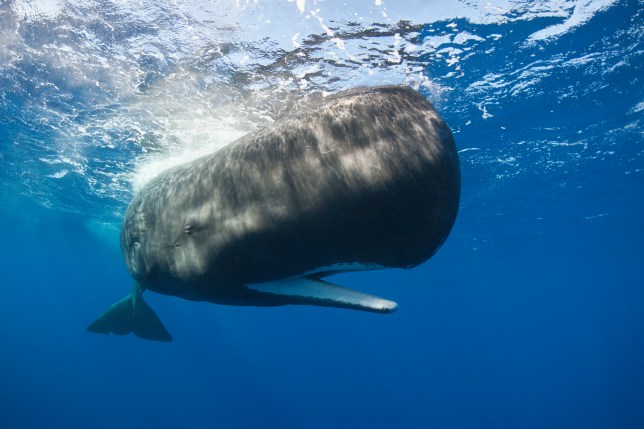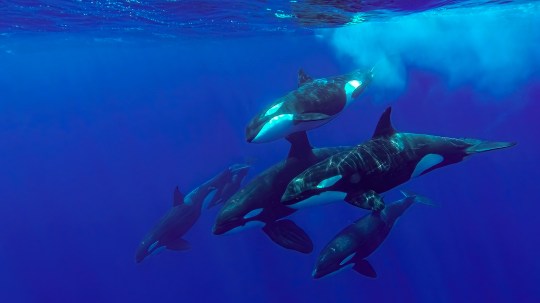Killer whales have been getting a bad rap of late, mainly due to attacking boats around Europe, but really they’re just trying to go about their business.
Unfortunately for a pod of orcas off the coast of Western Australia, they encountered some business of a rather different – and dirty – kind after tackling a group of five sperm whales.
Sperm whales are generally considered an apex predator, meaning they’re top of the food chain and don’t need to worry about being eaten, just eating.
However, whale watchers on a trip around the Bremer Canyon watched in shock last week as members of the ‘Split Tip’ pod of killer whales launched an attack on the group, one of which was considerably smaller than the others, possibly a juvenile.
Marine biologist Jennah Tucker, who was on board, said: ‘As we approached, the group of sperm whales appeared distressed and exhausted, huddled in a tight group, poking the tips of their heads out of the water and letting out heaving blows as they tried to regain their breath.
‘Members of Split Tip’s pod including Wonks and Flapper swam tight circles around the huddled sperm whales who were thrashing their tails around to fend off the predators.’
Soon after, a ‘large dark bubble rose to the surface amongst the huddle’, which onlookers thought to be blood.
‘But something was off,’ said Ms Tucker. ‘One of the killer whales began tail slapping off our port side and the others quickly moved off from the sperm whale huddle.’
It turns out the bubble was not blood, but a ‘cloud of diarrhoea’.
Yes, the sperm whales used defensive defecation to save their little one.
‘The cloud of diarrhoea created when the whale waves its tail through its poo acts to deter predators and in this case, seemed to work,’ said Ms Tucker, sharing the story in a blog post.
‘Given their faeces appear reddish in colour, due to their diet consisting of 90% squid, it’s no surprise it was easily mistaken for blood.’
Sperm whales: the lowdown
- Sperm whales (Physeter macrocephalus) are the largest toothed whale (ondontocete) and can grow to be almost 16 metres long
- They have the largest brain of any animal on the planet
- They also have the most powerful sonar, which relies on a special organ known as a ‘melon’ – the melon and massive brain combined lead to their distinctive rectangular heads
- Sperm whales can dive down to more than a kilometre below the surface, and hold their breath for up to two hours at a time
- They mainly eat squid, but are also partial to sharks and other fish
- Sperm whales are found across the oceans between the tropics and the poles
It’s a tactic the orcas may not have been expecting, and certainly ruined their dinner plans, but also highlights the weird and wonderful interactions that go on in nature mostly unseen by human eyes.
‘Events like this are rarely witnessed, let alone documented, with only a handful of accounts having been recorded globally, and will always remain an immense privilege and a reminder of just how wild these animals and this place are,’ said Ms Tucker.
The Split Tip pod probably felt less privileged, and hope not to witness the event again.
MORE : Star Trek might have predicted the future of AI
MORE : This is what you look like to some people with rare brain disorder
MORE : Brits reveal what they think aliens really look like – and it’s not pretty
Get your need-to-know
latest news, feel-good stories, analysis and more
This site is protected by reCAPTCHA and the Google Privacy Policy and Terms of Service apply.














